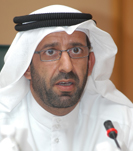Sheikh Hamdan Award For Medical Sciences Receives 152 Researches From 27 Countries To Participate In The 3rd Pan Arab Human Genetics Conference The United Arab Of Emirates Provides 24 Unique Research Papers The Declaration Of Selected Papers Is On February 18
07 February 2010
"Sheikh Hamdan Bin Rashid Al Maktoum Award for Medical Sciences" declared that the door of receiving genetic research papers to be presented in the "3rd Pan Arab Human Genetic Conference” has been closed. The conference will be held under the title "Genomic Healthcare" in Al Bustan Rotana Hotel in Dubai during 13th and 14th of March.
The award’s “Centre for Arab Genomic Studies” is the organizer of the conference. The center received 152 research papers from 27 Arab and foreign countries. Foremost among these countries is the United Arab of Emirates, which provided 24 research papers, followed by the Kingdom of Saudi Arabia which provided 19 studies, followed by the Arab Republic of Egypt which presented 12 papers. Many Arab countries contributed such as Bahrain, Oman, Tunisia, Algeria, Morocco and Jordan. There are also many contributions from United States of America, Canada, the United Kingdom, Germany, France and Bulgaria.
Mahmoud Taleb Al Ali Dr. "Mahmoud Taleb Al Ali”, the Director of the Center for Arab Genomic Studies and the Chairman of the Scientific Committee of the Conference praised of the outstanding level of papers being presented this year, especially from Arab countries that have witnessed significant growth compared to previous years, making the task of selecting papers a tough one. He said that the Conference Scientific Committee has been formed under his chairmanship and the membership of five members specialized in the science of human genetics, namely Dr Ghazi Tadmouri Assistant Director of the Centre for Arab Genomic Studies, Dr. lihadh Al-Gazali from the United Arab of Emirates, Dr. Fahd Al-Mulla of Kuwait, Professor Hanan al hamamy from Iraq, and Dr. Moien Kanaan from Palestine. He added that the Scientific Committee will assess all research presented based on the actual value of the scientific content and its relevance to the theme of the conference, and the priority in the selection will be for research of interest to the peoples of the region. Members of the Scientific Committee of the Conference will provide a comprehensive report evaluating each research.
The Scientific Committee will choose 15 papers to be presented in the Conference through its three sessions which will be held on the first day of the conference. As for the rest of selected papers it will be presented as posters in the conference. He added that he expected the participation of 500 doctors and students in the conference from various faculties of medicine in the Arab world and from different disciplines. He also added that results of the process will be announced on February 18.
“Dr. Mahmoud Taleb Al Ali” pointed out that, in addition to lectures and researches presented on the first day of the Conference, the Conference will hold a very special session under the title "open clinic" early in the second day of the conference to present many cases of patients suffering from rare genetic diseases or diseases that are difficult to diagnose. The later part of the day is devoted to a symposium open to the public entitled "The role of media in genetic literacy in the Arab world" in which senior geneticists and significant media professionals will discuss related issues in front of a general audience interested in the science of genetics.

